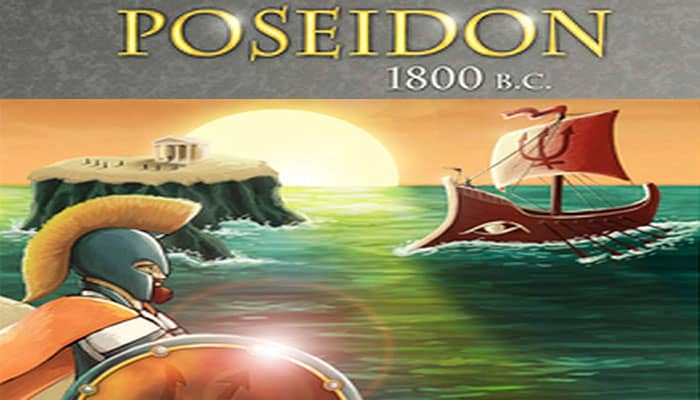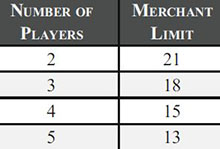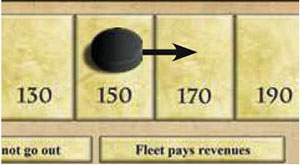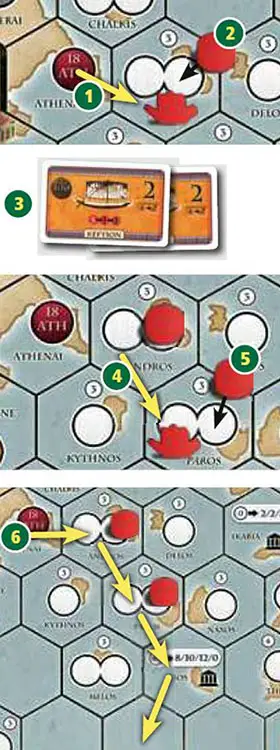
Components

- 1 map
- 30 Ship cards
- 6 Special cards
- 8 King cards
- 1 Starting Player card
- 8 Nation charters
- 160 wooden disks
- 8 Discovery ships
- 8 Prestige markers
- 8 High Culture markers
- 8 New Home markers
- 1 White Delian League marker
- 1 Turn marker
- Playing money
- Rulebook
Object of the Game
At the end of the game, a player's worth is determined by the value of his merchants and cash on hand. The highest net worth wins.
Setup
Place the mapboard on the table. Sort the ships by their number (=reach) with the 2-ships on top and put them on the appropriate space on the board.
Place the 6 Special cards in the middle where all players can see them. Determine player order and pick a starting player at random.
Each player receives starting capital depending on the number of players:
- 2 players 780 drachma
- 3 players 580 drachma
- 4 players 440 drachma
- 5 players 400 drachma
Game Play
The game consists of alternating Merchant and Exploration Rounds, preceded by a special Poseidon Round. The sequence of these rounds is given on the left side of the map.
1. The Poseidon Round (PR)
The player to the right of the Starting player begins in the PR, then play continues counter-clockwise. Each player chooses one of the Special cards and pays its printed value to the bank. They can not pass.
- Ina 2-player game, each player buys 2 more Special cards (a total of 3 each)
- In a 3-player game, each player buys 1 more Special card (a total of 2 each)
- With 4 and 5 players, all remaining Special cards are removed from the game (players will have 1 Special card).
The Special Cards
The Special cards give the noted income to their owners at the beginning of each Exploration Round, varying with the phase of the game. In addition, they have the listed special powers.
At the beginning of each Exploration round, the owner of each card decides if he wants to collect income from the card or use its ability.
With the exception of P4 (Poseidon), all Special cards are void and discarded after their special powers haven been used.

The owner of this Special card gets the white Delian League marker. Once during the game, he can put that marker at any time under a trading post of any nation he's the king of. This doubles the value of that trading post for that nation permanently. The marker can't be used for the New World areas, and cannot be moved once placed.

With each of those three special cards, a player can give a nation he's the king of a special "high culture" trading post without moving the discovery ship there. (A nation may have no more than one high culture).
This happens at the beginning of an Exploration Round, so the owner can choose to either get the income or give the nation a new source of income. The three hexes are reserved for the high culture trading posts; no other trading posts or New Homes can be established there.

Doubles the range of the fleet of any one nation once each in phases 2, 3 and 4. If the phase is over and Poseidon has not been used, that phase's usage is void. If the action is used, the card is flipped over until the start of a new phase.

This Special card can be traded for any merchant from the merchants pool at the beginning of a Exploration Round. This happens instead of getting income.
All special cards other than Poseidon are void as soon as they use their special ability.
2. Merchant Rounds (MR)

Following the Poseidon round, the first MR starts. It begins with the starting player and continues clockwise until all players have passed in order.
On a player's turn, that player can:
-
Make a maximum of ONE purchase, from two options:
- Take over (buy) a king's card of a nation (and several merchants with it) that has no king yet.
- Or take over (buy) exactly 1 merchant from those in the Merchant pool.
-
In addition to, or instead of a purchase, a player may give up (sell) any number of merchants.
-
If a player wishes to neither sell nor buy, they may pass; they retain the right to act on future turns.
After all players have passed consecutively, the Starting player card moves one player in clockwise order. After MR 2, 3, 4 and 5, the top ship from the ship deck is removed from the game.
The King's Card
Before any player can take over merchants of a nation, that nation has to be founded by someone buying the King's card.
When a player is founding a new nation, that player performs the following actions:
- Choose a nation and get that nation's charter and all potentials (18, 20 or 22).
- Set the initial prestige value per merchant and place the prestige marker on the prestige track. This can be any value on the Prestige track.
- Place an odd number of disks in the Merchant pool, but at least 5. These disks become Merchants for the nation.
- Get money for the nation's coffers following the formula (new merchants x prestige).
- Buy at least 50% (rounded up) of the newly placed Merchants from the Merchant pool. The money is paid to the bank.
- Place 3 of the purchased Merchants on the King's card and the rest next to it.
- Take the discovery ship and place it in the home port.
The remaining disks stay on that nation's charter and can be used later as either additional merchants or trading posts.
The player founding the nation can't sell those merchants nor buy additional merchants of that nation during that MR.
Example: Jakob founds Ambrakia, sets the prestige to 70
1and places 7 of the 22 black potentials into the Merchant pool2. Ambrakia gets 7 x 70=490 drachma. He now buys 4 of those merchants for 280 drachma,placing 3 on the Kings card3and 1 next to it4. The other 3 merchants can now be bought by any other player.
Later, at the beginning of phases 2 and 3 (when the first 4-ship and 6-ship are bought, respectively), the player who is king can decide to place additional disks into the Merchant pool as new Merchants for that nation.
- At the beginning of phase 2, the player can place up to 4 more merchants.
- At the beginning of phase 3, the player can place up to 6 more merchants.
The nation gets an amount of money corresponding to the number of new merchants times the actual prestige. This money is placed in the nation's coffers.
Overview of the nations:
| # | Name | Home | Color | Number of Potentials | |
|---|---|---|---|---|---|
| 1 | Ionians | Athenai | F10 | Red | 18 |
| 2 | Thracians | Thessalonike | A9 | Blue | 18 |
| 3 | Dorians | Sparta | H9 | Yellow | 20 |
| 4 | Aeolians | Thebai | E9 | Gray | 20 |
| 5 | Thessalians | Larissa | C9 | Orange | 20 |
| 6 | Cypselides | Korinthos | F8 | Green | 20 |
| 7 | Arcadians | Megalopolis | G7 | Purple | 22 |
| 8 | Aetolians | Ambrakia | D6 | Black | 22 |
Taking over a merchant license
When it's a player's turn during an MR, that player can buy exactly 1 Merchant from the Merchant pool. Merchants are available for their nation's actual prestige value. The player pays the money to the bank. Each player may hold a maximum number of Merchants (including those on King's cards):

Giving up merchant licenses
When it's a player's turn during an MR, he can put back any number ofMerchants into the Merchant pool and get the current prestige paid out by the bank.
The 3 Merchants on a King's card can never be given up, unless the King card itself is transferred to another player.
Change of Prestige during a Merchant Round
If a king gives up merchant licenses of his nation, the prestige marker is moved one step to the left (regardless of the number of merchants given up). The prestige marker is not moved if players other than the King give up merchants
Change of Government
At the end of each MR, for each nation in operating order, check to see if any player holds more merchants than the current king. If so, starting with the player with the most merchants, give each such player the opportunity to take over the King's card. (Ties are broken in clockwise order from the current King).
The player may choose to:
- Take over the King's card, with all rights and duties, giving the former owner three merchants in return or
- tolerate the current minority government.
3. Exploration Rounds (ER)
Course of action during an ER:
-
- Owners of Special cards P1, P2, P3, and P5, in that order, may choose to use their Special powers.
- Special cards (P0-P5) pay their income to their owner;
-
Each king may take money from that nation's coffers and cash it in (depending on the phase: 5/10/15/20 drachma)
-
Nations act (highest prestige first; if nations are tied for prestige, use stacking order)
- a. Move the discovery ship, build trading posts and/or New Home
- b. Calculate revenue
- c. Buy new ships and (from Phase 2 on) buy ships from other nations
Special cards and King's money
The Special cards pay a fixed revenue that's dependent on the actual phase, as printed on the card. Then, each King may take 5/10/15/20 drachma (dependent on the actual phase) from the nation's coffers and put them in his personal treasure.

Move the discovery ship and build trading posts
Each nation has one discovery ship token. This ship moves on the map to build new trading posts. The range of that ship always equals the actual phase. Therefore, at the start of the game, it can move 1 hex per Exploration Round.
That nation can build trading posts on all hexes with white circles the ship touched this turn (including the hex it started on). In later phases, multiple trading posts can be build each turn. During Phase 1, there may be only 1 trading post per hex, regardless of which nation and regardless of the number of white circles on that hex.
From Phase 2 on, there can be 2 trading posts (from different nations) on hexes with at least 2 white circles; from Phase 3 on, there can be 3 trading posts from different nations on hexes with at least 3 white circles. In Phase 4, the dark blue off-board locations can hold trading posts from 4 different nations.
Nations use their potentials as trading posts. In the home port, no trading post is established.
New Home
The Trading fleet always starts from its home port, but it is possible to establish a New Home in another hex, after which the fleet may choose, each turn, to start from either the original or new home.
The New Home marker may be placed in a circle on any unoccupied hex visited by the nation's Discovery Ship this turn. Once a New Home token has been placed on a hex, no other (New Home or Trading Post) tokens may be placed there.
Like the fleet's original home, the value of the hex with the New Home is zero. A New Home can neither be placed on one of the New World locations (Kyrene and Kypros) nor on one of the High cultures (P1-P3).
Calculate Revenue

Each nation has one or more ships - their trading fleet. This fleet visits several of that nation's trading posts. The range of a fleet is always the sum of the ships' value.
The range is the number of hexes a fleet can move. The fleet always starts either from the home port or from the New Home. The fleet may not cross the dark lines on the map (for example, the border between Ainos and Perinthos), but must sail around them.
The fleet may sail past hexes where it does not have a trading post, whether the hex contains no circles, empty circles, or circles filled by other nations' trading posts.
The fleet produces revenue by visiting temples and its nation's trading posts. Some of the temples ask for a donation of 10, 20 or 40 drachma from the nation's coffers to produce revenue, others are free.
The two New World locations (Kyrene and Kypros, shown in darker blue on the map) can be visited only by Endless- ships. E-ships can visit any number of trading posts, but only one of the New World locations, even if that nation has trading posts in both New World locations.
The King decides if he's sending out his fleet or not.
If the fleet goes out, the total revenue is the sum of all temples and trading posts owned by that nation which are visited. Per merchant, that value is paid to the players that hold merchants of that nation.
If the fleet stays at home, a fixed sum (100/200/300/400 drachma, depending on the actual phase) is paid into the nation's coffers.
If the nation has no ships (for example in its first ER), there are no revenues.
Change of Prestige in Exploration Rounds

If the fleet went out and revenue was paid to that nation's merchants, the prestige marker moves one space to the right.
In all other cases, it stays in its current location.
Stacking rule: If a prestige marker is moved onto a space that already holds one or more markers, the arriving marker is put on the bottom of the stack.
Buying Ships
The last possible action for a nation in its Exploration phase is the purchase of ships for its fleet. The ships are available in order. At the beginning of the game, only 2-ships are available, which can sail for 2 hexes. Only after all 2-ships are sold, 3-ships are available. The ships' price is listed on the ship card and is paid out of that nation's coffers.
Ships always sail as a fleet, the value of the ships is added. Each nation always has to have at least one ship, the maximum number of ships allowed is 3. The purchase of the first 4-ship and the first 6-ship forces the change of phases.
Purchase of the First 4-ship

The game is halted temporarily, even in the middle of a turn. Each nation can use up to 4 disks from their supply and make them into new merchants, putting them into the Merchant box.
That nation places the new money into its coffers (new merchants x actual prestige). Nations decide on the number of new merchants in actual playing order (highest prestige first).All 2-ships are obsolete now and leave the game without compensation.
Hexes with at least 2 white circles can now hold trading posts from 2 different nations.
The range of the Discovery ship now is 2 hexes.
Purchasing ships from nations now is permitted. During the action "Buying Trading Ships", ships now can be bought from other nations for any price (at least 1 drachma) if the nations' kings agree on the price.
If the king of a nation decides that his fleet won't go out, that nation gets 200 drachma into its coffers.
Purchase of the First 6-ship

The game is halted temporarily. Each nation can use up to 6 potentials from their supply and make them into new merchants, putting them into the Merchant box.
That nation gets new money into its coffers (new merchants x actual prestige). Nations decide on the number of new merchants in actual playing order (highest prestige first).All 3-ships are obsolete now and leave the game without compensation.
Hexes with at least 3 white circles can now hold trading posts from 3 different nations.
The range of the Discovery ship now is 3.
If the king of a nation decides that his fleet won't go out, that nation gets 300 drachma into its coffers.
Purchase of the First E-ship

All 4-ships are obsolete now and leave the game without compensation.
In the New World locations, trading posts of up to 4 nations can now be built.
The range of the Discovery ship now is 4.
If the king of a nation decides that his fleet won't go out, that nation gets 400 drachma into its coffers.
All temples lose their revenue.
With the purchase of an E-ship, you can trade in one of your other ships for half its value. For example, a 5-ship reduces the cost for an E-ship by 250 drachma. For the purchase of the first E-ship, a 4-ship can be traded in for 150 drachma just before the 4-ships become obsolete.
Example for the first 2 exploration rounds for Athenai:

Er1:
1The Discovery ship moves 1 hex to Andros
2A red potential is placed on Andros as a trading post. There's no income, as Athenai has no ships.
3Athenai buys two 2-ships and pays 200 drachma from her coffers.
Er2:
4The discovery ship moves 1 hex to Paros.
5A red potential is placed on Paros as a trading post.
6Revenue is calculated:
Athenai has two 2-ships, therefore afleet range of 4. Thefleet can move 4 hexes and visit all own trading posts on the way as well as the neutral temples. The Ios temple has a revenue of 8 if the nation pays 40 drachma from its coffers.
Athenai pays 40 drachma and therefore has a total revenue of 14: Andros 3 + Paros 3 + Ios 8 The fourth hex the fleet could move to is void as there's no other own trading post or temple within range.
For each Athenai merchant a player holds, that player gets 14 drachma.
Forced Purchase of a Trading Ship
Each nation must have at least 1 ship at the end of its turn in a Exploration Round. If a nation has no ship (in its first ER; or because all ships went obsolete; or another nation bought its last ship), it must buy one.
If the nation does not have enough money to buy a ship, the King must transform potentials into new merchants by putting them into the Merchant Pool.
The nation's prestige value drops one space to the left, and the nation receives that new value times the number of merchants created. (Only enough new merchants to raise enough money to buy the next ship available may be created).
If the nation has used up all of its potentials and still does not have enough money to buy a ship, the King must pay the remaining amount from his own treasure, possibly selling merchants (of that nation or other nations) to raise the needed funds. (As always, if a player sells merchants of a nation he is King of, that nation's prestige value drops one space to the left).
Money raised in this manner cannot be used to buy ships from another nation, only from the bank. If the King cannot raise enough money to buy a ship, because the only merchants he has left are those on King's cards, he is bankrupt and forfeits all of his cash to the bank.
The current ER is completed and then the game ends early. (Thus, it is possible for more than one player to go bankrupt).
End of the Game
The game ends after the eleventh Exploration Round. Players calculate their total wealth by adding their personal money to the prestige value of their merchants.
The player with the highest score wins.
Money on the nations' charters has no value at game end.
Poseidon with 2 players
Only 6 nations and the Eastern part of the map are used. Remove one each of 3-ship, 5-ship, 7-ship from the game.
Continue Reading

